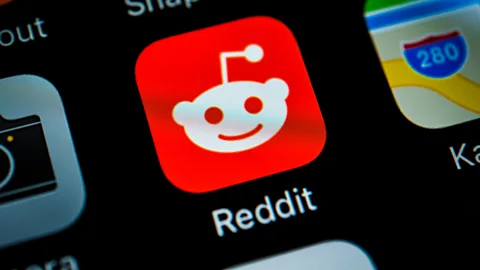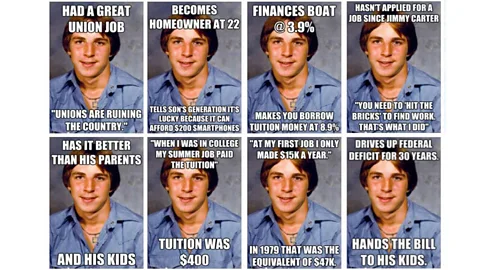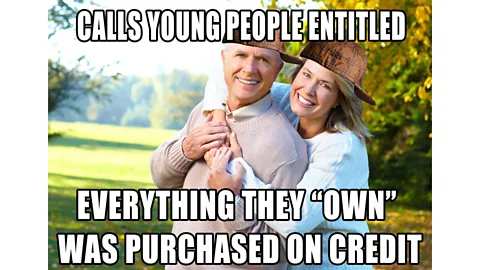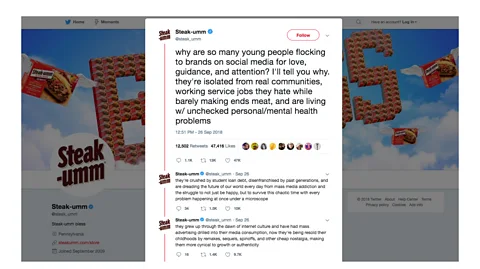How memes got broke millennials through the recession
 Alamy
AlamyWhen the world went into financial crisis, millennials left behind in the chaos found solace in the only place that understood them: the internet.
Robert Allam, 32, ended up in the UK after a childhood spent between Lebanon and Greece. Allam first came to London in 2006 for university, and earned a masters degree in landscape architecture from the University of East London. But although he had come to London specifically for better job prospects, he didn’t find work. Graduating deep in the trenches of global recession meant that jobs were scarce – including within his field.
The global financial crisis of 2008 hit millennials the hardest. Newly minted university graduates entered a workforce in which an additional 30 million workers became unemployed between 2007 and 2010. Forty-three percent of new graduates in the US took jobs that did not require a university degree. Millennials went on to spend the next 10 years trying to make up for lost time against the backdrop of financial austerity and a “jobless recovery”. Of the 43% of underemployed millennials, 29% of them remained underemployed five years on – after a decade, that percentage has only dropped by nine points.
While searching for work after graduation in 2013, Allam began posting to Reddit under the username ‘Gallowboob’. Reddit, which is now the 18th most popular website worldwide, became a hub for disenfranchised and underemployed millennials to voice their frustrations, based partly on the generation’s ability to harness its power of communication.
Gallowboob became – and remains – one of Reddit’s most famous and prolific posters. He created content that went viral almost instantly, having a post on Reddit’s front page on a near-daily basis. Five years later, Allam has built on his Reddit successes and now makes his living as digital company Supload’s chief marketing officer and BoredPanda’s content manager.
“We depend on a lot of changing technologies and platforms,” he says. “We ended up understanding the fabric of the internet.”
Reddit is a blank slate for users to share and create content, and also choose what is most visible. Posts get to the top of the Reddit homepage based on the number of ‘upvotes’ they garner. The memes that often rocket up often reflect the zeitgeist – be them humorous and light-hearted, or depressing and anxiety-driven. The same internet phenomenon that years ago gave us the ‘I Can Haz Cheezburger cat’ also helps users delve into the frustrations of unemployment and financial hardships.
Memes became a quick and easy outlet for expression, and Reddit a readily available forum to channel these feelings. A photo with a few words could combat prevailing stereotypes of a lazy, entitled millennial generation that baby boomers and Gen Xers had become quick to hand down – and do so where peers from corners of the globe who were going through the same experience.
 Reddit
RedditThese ‘austerity memes’ provided an unusual kind of community, says Allam. It was “the kind of depressed where [people] rally behind it – where they all relate to each other”.
For those creating and sharing them, austerity memes became more than just a worldwide attempt at humour. Instead, they provided a near-instantaneous means of communication that helped people vent their frustrations, from anywhere around the world, to a worldwide community that understood exactly what their creators were going through.
‘Very fertile soil’
During the financial crisis, memes provided an outlet for expressing global insecurities about the future that awaited millennials, and gave the internet generation a way to discuss these issues in near real-time.
Michele Coscia, assistant professor of IT at the University of Copenhagen, studies why and how memes become popular on social media networks. He says one major reason is due to how rapidly thoughts can be shared and commented on by way of an ever-increasing number of memes that are in dialogue with one another. “Memes and social media are a very quick medium to send a message. It’s very easy to make one, and it’s very easy to get an immediate response from one.”
Initially, this manifested itself as memes about cute animals or funny observations. But as the developed world grappled with the worst recession in a generation, internet users found their global system of communication also worked to help convey frustrations and express their opinions outside of the conventional media framework.
“The austerity situation is very fertile soil for this, because it’s rather easy to have an extreme opinion about it,” says Coscia. “Extreme opinions are more original than moderate opinions. If you are extreme, you can more easily catch attention.”
Early memes featured innocuous themes: cats, puns, and Chuck Norris facts. But as economic conditions evolved, the global meme dialogue adapted with it. Memes became more personal and pointed as they encapsulated the collective frustration millennials felt.
 Reddit
Reddit“The medium itself is not neutral to the message. If the content is more original – if you’re able to create something less similar to what’s been created before, it’s more likely to go viral,” says Coscia.
As austerity memes took off, creators sought to riff on the global financial situation in unique ways. Often in dialogue with each other, some memes poked fun at the financial services industry by posting photos of ‘sad guys on trading floors’. Others took a sarcastic look at the 1% by way of ‘Rich Raven,’ which poked fun at the global elite who survived austerity unscathed.
Most popular memes before the recession were lighthearted or offbeat just for fun, but the recession created a new global phenomenon that lent itself to meme-ification. “These types of memes weren’t there before 2007,” says Coscia. “After, there was a lot interior monologue discourse that happened online. Before, it was pictures of cats.”
Coping mechanisms
Nearly a decade after austerity policies and global recession, and even as some global economies recover from their 2008 lows, many young professionals still find themselves playing catch-up. Some are chasing new career paths, or grasping desperately for something that might be construed as a ‘normal’ working life. Youth unemployment in some countries, including Greece, still hovers near record highs.
Perhaps it is unsurprising, then, that austerity memes still proliferate online.
In some cases, these monologues come from unlikely sources. In September, the Twitter account of Steak-umm, a US sliced-steak company, made waves when it published a six-part exegesis on millennial angst, anxiety and hopelessness. The manifesto was spontaneous. But instead of quickly deleting the posts and reprimanding the social media manager behind them, Steak-umm decided to stand behind the messages – and the millennial responsible for publishing them.
 @steak_umm
@steak_ummNathan Allebach, 27, is the social media coordinator behind Steak-umm’s social media presence. The account is not averse to being edgy, with offbeat posts that pick up on popular memes and the occasional Twitter spat with other notable brand accounts. Allebach’s post about millennial anxieties and frustrations, however, pulled at a deeper thread that synthesized many of the feelings of austerity-era memes.
Among the confusion, followers reacted with praise. “People are desperate for any form of connection and solidarity,” Allebach says. “They’re trapped underwater and any time they come up for air, they’re looking for something to connect with.”
Where have all the cats gone?
In troubled economic times, these memes allowed an economically disadvantaged generation to share a sense of solidarity – and appear to have remained an outlet for the same reason. In some ways, their triviality and humour enabled their approachability to travel across national borders and political divides.
Although, Coscia says: “The world pre-2008 was very nice when you could just look of pictures of cats and be content.”
